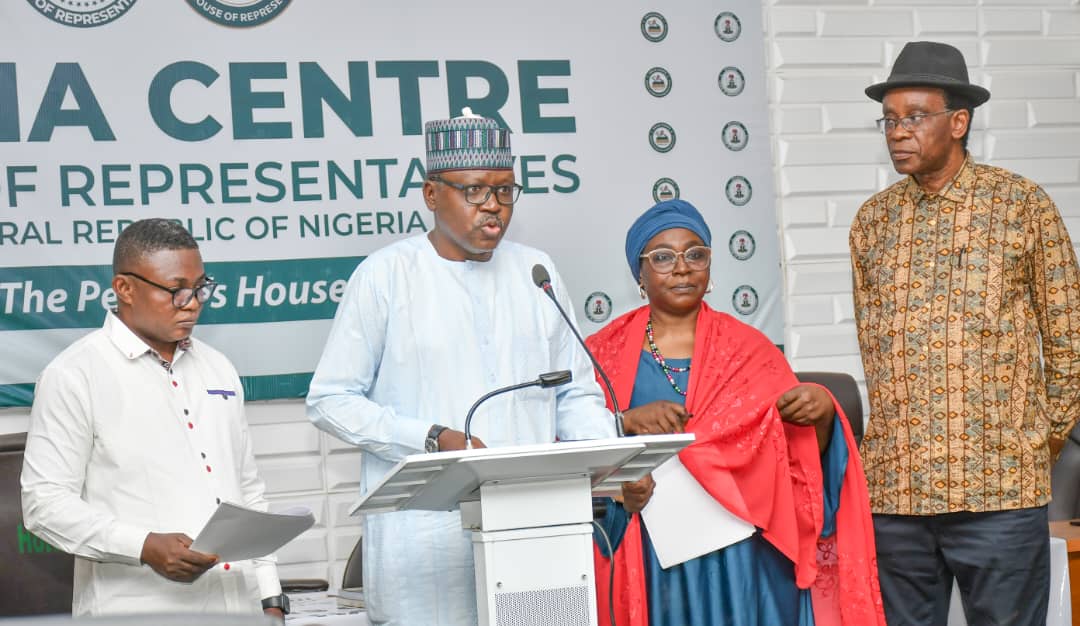News
Security requires stakeholders’ collaboration – Speaker Abbas

Security requires stakeholders’ collaboration – Speaker Abbas
By Gloria Ikibah
The Speaker of the House of Representatives Hon. Abbas Tajudeen, Ph.D, on Tuesday, stressed the need for all stakeholders to collaborate towards security of life and property in Nigeria.
While stating that the 10th House is committed to providing all the legislative support needed to enhance security in the country, Speaker Abbas called for better collaborations between the legislative and the executive arms of the government as well as the Civil Society Organisations (CSOs) and the media.
The Speaker made the call in a keynote address at the 2024 Nigeria Defence Governance Forum Organised By the Africa Centre For Strategic Studies in Abuja on Tuesday.
Speaker Abbas noted that the forum added a significant voice to the ongoing national conversation on fostering dialogue and collaboration between key stakeholders in national security governance. He noted that the importance of the forum was even more obvious, considering Nigeria’s strategic importance.
“Security challenges have significant implications not only within our borders but also across West Africa and the broader African continent. The persistence and complexity of these issues underscore the critical need for regional and continental collaboration. Collaborative efforts are essential to address the transnational nature of terrorism, facilitate intelligence sharing, and harmonise economic and social development strategies, which can mitigate the root causes of insecurity,” he added.
The Speaker also stated that since the return of democracy in 1999, legislative control of the security sector in Nigeria has progressively improved.
He said, “Our standing committees have become more assertive in holding security sector agencies and actors to account,” adding that the scope of the activities of these committees has included monitoring the funds the government has budgeted for the sector, ensuring accountability in the use of allocated funds and personnel, and overseeing other issues such as hardware, human rights, among others.
He stressed the need for collaboration between the National Assembly, security and defence sector officials, and the public through the media and the Civil Society Organisations (CSOs) as “not only desirable but also constitutionally mandated and expected.”
He added: “Security sector agencies should commit to open communication, regularly providing accurate and detailed reports to the National Assembly. This includes adhering to legal and ethical standards and facilitating external audits and evaluations.”
On their part, Speaker Abbas said CSOs and the public could bolster these efforts by maintaining active engagement with legislative processes, offering independent assessments, and voicing concerns or recommendations.
The Speaker further said the legislature also required the assistance of security agencies, alongside stakeholders such as the public, CSOs, development partners, and the media, to integrate constituent and citizen perspectives into defence and security strategy and policymaking.
By facilitating inclusive dialogues and public forums, he stated that the diverse viewpoints and community needed are communicated to lawmakers.
“We expect CSOs and development partners to provide expert analyses, data-driven insights, empirical evidence, and international best practices to enrich our debates and decision-making. It is also important for the media to amplify such discussions, ensuring widespread public engagement and transparency. This collaborative approach will inform legislators with a broad spectrum of opinions and experiences and help us tailor security policies and laws to reflect the actual needs and aspirations of the citizenry.”
Speaker Abbas also called on the media to focus on rigorous reporting and coverage of security sector activities, highlighting compliance and discrepancies in the officials’ engagements with the legislature.
“Through this multifaceted approach, we can ensure continuous oversight and enhance the security sector’s governance, which aligns with best practices for democratic oversight.”
News
Civil Society Groups Urge FG To Halt Oil Asset Divestments in Niger Delta

The Coalition of Civil Society Organizations (CSOs) has called on President Bola Tinubu and the National Assembly to stop all ongoing and planned divestments of oil assets in the Niger Delta region by oil companies.
This demand was outlined in a petition titled “Urgent Call to Halt All Divestment in the Niger Delta, Including Shell’s Refused Sale of SPDC Shares”, addressed to President Tinubu on December 16, 2024, and Speaker of the House of Representatives, Rep. Tajudeen Abbas on December 18, 2024.
During a press briefing in Abuja, Mr. Isaac Botti, Programmes Coordinator of Social Action Nigeria, and Reverend Nnimmo Bassey, Founder of Health of Mother Earth Foundation (HOMEF), highlighted the severe environmental and social impacts of oil exploration in the Niger Delta. They stated:
“We are here as representatives of Nigerian society organizations, community leaders, and concerned citizens to address a grave and urgent issue that threatens not only the people of the Niger Delta but the environmental and economic interests of Nigeria and the social future of all Nigerians”, he said.
The Coalition expressed concern over the divestment process by International Oil Companies (IOCs), particularly Shell’s proposed sale of its remaining shares in the Shell Petroleum Development Company (SPDC) to the Renaissance consortium, as well as similar moves by companies like TotalEnergies.
They warned that these actions could undermine national interests and exacerbate environmental damage in the region.
The Coalition detailed extensive damage caused by decades of oil exploration, including:
- Water Contamination: High levels of hydrocarbons in water sources have rendered them unsafe for drinking.
- Soil Degradation: Continuous oil spills have destroyed farmlands, threatening food security.
- Biodiversity Loss: Entire ecosystems have been decimated by oil spills.
Citing reports by the United Nations Environment Programme (UNEP) and the Bayelsa State Oil and Environment Commission (BSOEC), the Coalition provided alarming statistics. UNEP revealed benzene levels 900 times above safe limits in Ogoniland, while chromium levels in Bayelsa were over 1,000 times higher than World Health Organization (WHO) standards.
The BSOEC estimated it would cost at least $12 billion to remediate Bayelsa over 12 years, with a broader cleanup across the Niger Delta requiring $100 billion. Comparatively, the Deepwater Horizon oil spill in the U.S. saw BP pay $60 billion for damages from a single incident.
The Coalition emphasized that past divestments by Shell, ENI/AGIP, and ExxonMobil have left unresolved environmental liabilities:
- Shell’s sale to Aiteo in Nembe resulted in worsening pollution without proper cleanup efforts.
- ExxonMobil and ENI/AGIP similarly failed to ensure adequate environmental management post-divestment.
These cases have set a troubling precedent of IOCs avoiding accountability for environmental degradation.
The Coalition urged the federal government and the National Assembly to take immediate action by:
- Halting all IOC divestments until historical environmental liabilities are addressed.
- Ensuring inclusive consultations with host communities before divestments.
- Mandating that Shell, TotalEnergies, and other IOCs fund cleanup and remediation efforts.
- Upholding the regulatory independence of the Nigerian Upstream Petroleum Regulatory Commission (NUPRC).
- Creating an Environmental Restoration Fund to support long-term remediation.
They also demanded profit-sharing opportunities for host communities and the inclusion of gas flaring cessation in divestment agreements.
The Coalition stressed that approving Shell’s SPDC share sale without addressing environmental and social liabilities would undermine Nigeria’s sovereignty and well-being.
“Approving Shell’s or TotalEnergies’ divestment in its current form without addressing the profound environmental and social costs would be a grave injustice to the people of the Niger Delta and could lead to significant unrest in the region.”, it stated.
The Coalition reaffirmed its commitment to ensuring environmental justice and called on President Tinubu and the National Assembly to prioritize the welfare of Nigerians over corporate interests.
News
NUJ-FCT Council Commiserates With Emmanuel Fateman Over the Loss of Wife

News
Reps Debate 2025 Budget Estimates, Demand Better Allocation for Security, Agriculture

-

 News22 hours ago
News22 hours agoLawmaker laments over 2023, 2024, 2025 budget running in one circle
-

 News22 hours ago
News22 hours agoVideo: Tinubu Arrives Lagos, Meets Old ‘Friend’ Papa Ajasco
-

 Sports21 hours ago
Sports21 hours agoI Failed In Front of the World Four Years Ago — Lookman’s Touching Speech After Winning CAF Award
-

 Economy22 hours ago
Economy22 hours agoUK inflation rises further ahead of Bank of England rates decision
-

 News14 hours ago
News14 hours agoLeadership crisis rocks office of AGF, may delay payment of Dec salary
-

 News22 hours ago
News22 hours agoLagos Mosque Takes Down ‘Jesus Christ is Not God’ Banner After Backlash
-

 News21 hours ago
News21 hours agoTinubu, Oborevwori Distribute Cash, Rice, Medical Supplies To Elders In Delta
-

 Economy21 hours ago
Economy21 hours agoDangote Refinery, NNPCL resume fight over $1bn loan








